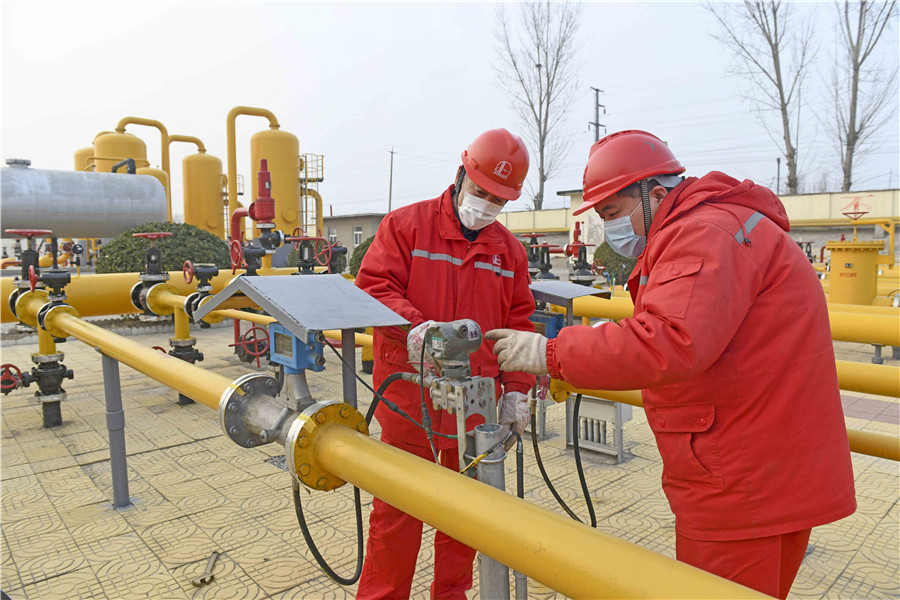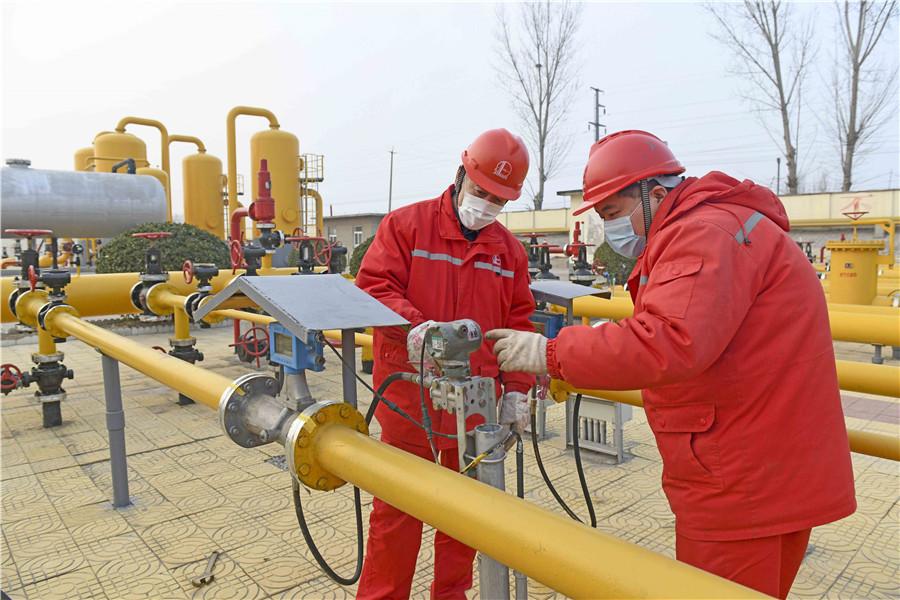
Technicians of Sinopec check gas facilities in Puyang, Henan province.[Photo by Tong Jiang/For China Daily]
State-owned oil and gas companies are ramping up efforts to help domestic companies resume production to ease the impact of the novel coronavirus outbreak and maintain economic stability.
China National Petroleum Corp, the country's largest oil and gas producer in terms of output, has seen its average daily output for crude and gas rise 2.2 percent and 12.6 percent year-on-year during the Lunar New Year holiday.
The company's Changqing oil and gas field, the largest oil and gas production base of China that has been providing energy for more than 400 million residents in Beijing, Shaanxi and Inner Mongolia, produced 134.93 million cubic meters of natural gas daily during the Spring Festival period, while its Daqing oilfield has produced more than 2.6 million metric tons of crude and 483 million cubic meters of natural gas in January this year.
The Tarim oilfield in the Xinjiang Uygur autonomous region delivered more than 2.5 billion cubic meters of natural gas in January, a year-on-year increase of more than 100 million cubic meters, while the Xinjiang oilfield located in Karamay produced more than 1.09 million tons of crude and 260 million cubic meters of natural gas last month.
The corporation's drilling companies located in Gansu, Sichuan, Qinghai, Inner Mongolia and Xinjiang drilled 57 wells without a single case of infection, it said.
It has also been expanding production of raw materials necessary for protective supplies for medical workers on the frontline of the fight against novel coronavirus, including disinfectants, protective suits and masks.
So far it has donated 50 million yuan ($7.14 million) to Hubei, together with natural gas worth 20 million yuan, to 39 hospitals in the province. All its 700 gas stations in Hubei are in service and some 300 tons of diesel have been provided to Huoshenshan (Fire God Mountain) Hospital and Leishenshan (Thunder God Mountain) Hospital, the two hospitals built to treat patients infected by the coronavirus.
China Petrochemical Corp (Sinopec), China's largest oil refiner, has ramped up oil and gas as well as raw material supplies to produce medical materials, drugs and emergency supplies for the affected areas.
The company produced 2.98 million tons of crude in January, equal to that of last year. Gas production reached 2.62 billion cubic meters, a year-on-year increase of 5.7 percent. Crude processing volume reached 21.35 million tons, up 1.1 percent year-on-year, while oil products output reached 13.57 million tons, up 0.7 percent year-on-year.
All of the corporation's 1,800 gas stations in Hubei are running normally and it has provided 5 million cubic meters of natural gas to the province daily, with 3 million cubic meters transferred to the provincial capital of Wuhan, the center of the epidemic.
In addition to providing 15,000 tons of raw materials including polypropylene, for making masks, syringes and other medical supplies during the first week of February, it also supplied free natural gas on Tuesday to the Leishenshan Hospital.
China National Offshore Oil Corp, also known as CNOOC, has provided 73,700 tons of petroleum products during the Spring Festival holiday to provinces like Hubei and Zhejiang. Its 43 gas stations in Hubei are in service and have provided 4,900 tons of petroleum products to the region to help buffer the impact of the novel coronavirus outbreak.
It has also produced more than 32,500 tons of polyethylene and polypropylene, the raw material for masks, syringes and other medical supplies that are necessary to produce protective products against the novel coronavirus, to help ease the shortage of medical supplies.
Analysts said the country's State-owned energy giants have done a good job in ensuring domestic oil and gas production while in quarantine and helped prevent infection by the novel coronavirus during work.
"The energy giants have illustrated their anti-risk capability through the oil and gas production performance during the past few weeks," said Li Li, research director at energy consulting company ICIS China.
They have also helped soften the impact of the novel coronavirus epidemic on China's economy by ensuring domestic energy security and the supply of anti-epidemic materials, she said.
(Source: China Daily)




 A single purchase
A single purchase









